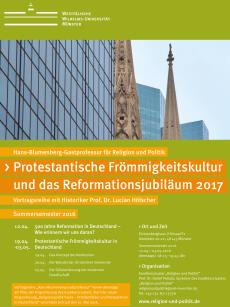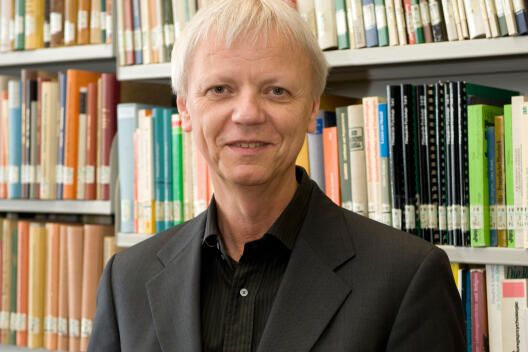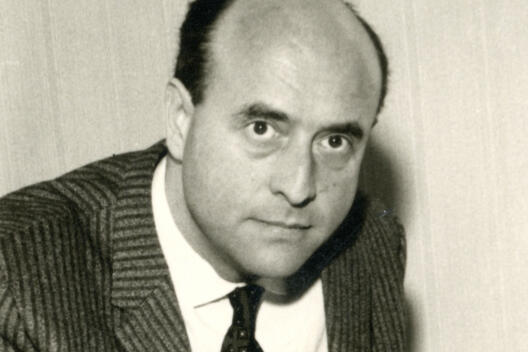New visiting professorship for religion and politics
For fresh international and interdisciplinary stimuli – historian Lucian Hölscher first Hans Blumenberg Visiting Professor to come to the Cluster of Excellence in Münster

The Bochum historian Prof. Dr. Lucian Hölscher is the first holder of the newly set up “Hans Blumenberg Visiting Professorship” at the University of Münster’s Cluster of Excellence “Religion and Politics”. In public lectures and in his research in the summer semester, he is going to address the 2017 anniversary of the Protestant Reformation and the culture of Protestant piety in Germany. The new visiting professorship is designed to contribute to bringing innovative stimuli from international research to Münster and consolidating the interdisciplinary compatibility at the Cluster of Excellence. Some 200 academics from more than 20 disciplines of the humanities and social sciences conduct research in the Cluster.
In his opening lecture on 12 April 2016, Lucian Hölscher will critically examine how state and church commemorate the Reformation 500 years ago. “The possibility of a new interpretation of the Reformation is up for discussion”, says Prof. Hölscher, “Not as a manifestation of the denominational separation but as part of the revival of Christianity on the cusp of the modern age.” The differences between Catholics and Protestants have largely disappeared from everyday life. The question is, however, whether this holds true for the Reformation’s sociopolitical impulses as well. The opening lecture, „500 Jahre Reformation in Deutschland – Wie erinnern wir uns daran?“ (500 years of Reformation in Germany – how do we remember it?) will be followed in April and May by three additional public lectures on the history of the culture of Protestant piety.
Prominent place for interdisciplinary religious research
During the visiting professorship in Münster, Prof. Hölscher will work on the second volume of his “Geschichte der protestantischen Frömmigkeit” (History of Protestant piety). The first volume, which covered the period from the Reformation to the beginning of the 20th century, is one of his most distinguished works. “Lucian Hölscher is one of the internationally leading representatives of social, cultural and religious history of the modern era, and has given major impetus to a new theory of history”, emphasises the speaker of the Cluster of Excellence, sociologist of religion Prof. Dr. Detlef Pollack. “His research findings are of high interest for our work. We expect important stimuli for our historical and social scientific research projects.”
In the semesters to come, other researchers from varying disciplines will be appointed to the Hans Blumenberg Visiting Professorship – named after the influential philosopher Hans Blumenberg (1920-1996) – e.g. from sociology, ethnology and law. Guest professors will be selected at the suggestion of the Cluster of Excellence’s Principle Investigators for one semester each. Members of the Cluster of Excellence conduct secular and denominational research across cultures and eras, and related to history and the present age. Münster has thus become a place of interdisciplinary religious research that is prominent in size and diversity.
The lectures of the “Hans Blumenberg Visiting Professorship” will be held on four Tuesdays between 6.15 and 7.45 pm as of 12 April 2016 in lecture theatre F2 at Fürstenberghaus, Domplatz 20-22 in Münster – the location of the public lecture series of the Cluster of Excellence “Religion and Politics”. For this reason, the start of the lecture series in the summer semester will be postponed to 10 May 2016, its title being “Religious politics today – problem areas and perspectives in Germany”.
Prof. Dr. Lucian Hölscher is emeritus professor for modern history and the theory of history at Ruhr-University Bochum (RUB). He has been a member of the board of RUB’s Käte Hamburger Kolleg “Dynamics of Religion between Asia and Europe”, which has a historical approach, since 2008 and is head of its research field 3, “The formation of the notion of religion”. (vvm/ska)



